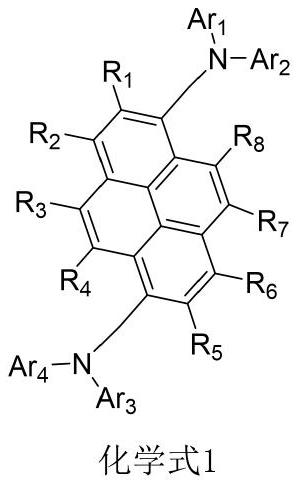Nitrogen-containing compounds, organic electroluminescent devices and electronic devices
A nitrogen compound and electroluminescence technology, applied in the field of organic materials, can solve the problems of poor stability, few types, and not enough to meet actual needs, and achieve the effects of long life, strong electron donating ability, and increasing glass transition temperature.
- Summary
- Abstract
- Description
- Claims
- Application Information
AI Technical Summary
Problems solved by technology
Method used
Image
Examples
Embodiment 1
[0167] Preparation of blue organic electroluminescent devices by the following method
[0168] Set the thickness to The ITO substrate (manufactured by Corning) was cut into a size of 40mm (length) × 40mm (width) × 0.7mm (thickness), and it was prepared into an experimental substrate with cathode, anode and insulating layer patterns by using a photolithography process. Ozone and O 2 :N 2 Plasma surface treatment was performed to increase the work function of the anode (experimental substrate) and to remove scum.
[0169] Vacuum-deposit m-MTDATA (4,4',4"-tris(N-3-methylphenyl-N-phenylamino)triphenylamine) on the experimental substrate (anode) to form a thickness of The hole injection layer (HIL), and the compound NPB is vacuum-evaporated on the hole injection layer to form a thickness of hole transport layer.
[0170] Evaporate TCTA (4,4',4"-tris(carbazol-9-yl)triphenylamine) on the hole transport layer to form a thickness of electron blocking layer (EBL).
[0171] Usi...
Embodiment 2-24
[0177] Substitute Example with Compounds 3, 4, 7, 8, 28, 36, 79, 82, 83, 106, 107, 108, 116, 117, 121, 122, 124, 125, 126, 128, 133, 134, 135 Compound 1 whose light-emitting layer was co-evaporated with α,β-ADN in 1 was prepared according to the method in Example 1 to prepare a corresponding blue organic electroluminescent device.
PUM
 Login to View More
Login to View More Abstract
Description
Claims
Application Information
 Login to View More
Login to View More - R&D
- Intellectual Property
- Life Sciences
- Materials
- Tech Scout
- Unparalleled Data Quality
- Higher Quality Content
- 60% Fewer Hallucinations
Browse by: Latest US Patents, China's latest patents, Technical Efficacy Thesaurus, Application Domain, Technology Topic, Popular Technical Reports.
© 2025 PatSnap. All rights reserved.Legal|Privacy policy|Modern Slavery Act Transparency Statement|Sitemap|About US| Contact US: help@patsnap.com



